By Carola Kreitmayr
July 18, 2022 • 16 min read

Predictions about the future of the logistics industry often discuss the consequences of automation. Although this process will definitely impact the way this industry operates, other challenges should be addressed as well. For this reason, this article deals with stress-related mental and physical health problems in logistics professions.
Jobs in the transportation industry are highly affected by the increased use of technology, since the automation of processes will undoubtedly result in a higher demand for highly skilled labour while decreasing the need for middle- and low-skilled jobs. Especially for administrative and service activities, or jobs in the transport sector, the technological advances could therefore lead to a skills mismatch [1].
However, jobs in the transport sector are not only affected by the consequences of digitalization, but the CBS data suggests that many workers in this industry are worn out because of their jobs. The CBS conducted a study at the end of 2020 to find out which jobs cause a poor work-life balance. Of all the employees they asked, 7.6% state the regular experience of a work-life imbalance. Lorry drivers, however, confirm in 18% of the cases that they feel a work-life imbalance often or very often. This means that compared to the cross-section of all professions surveyed, truck drivers report a work-life imbalance 237% as often [2].
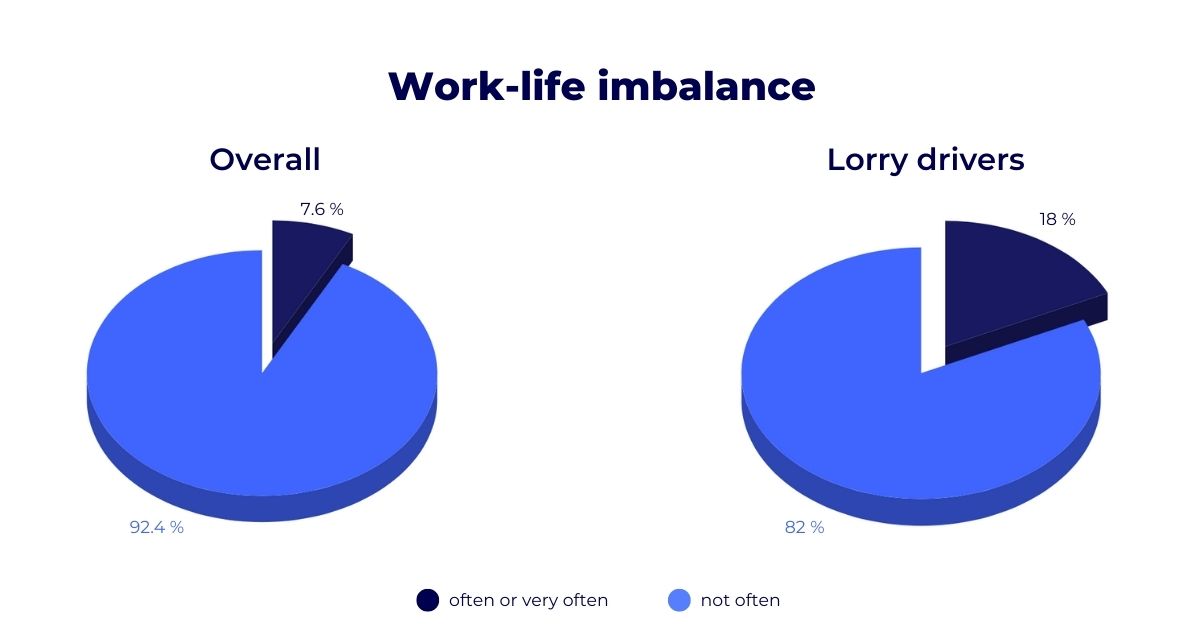
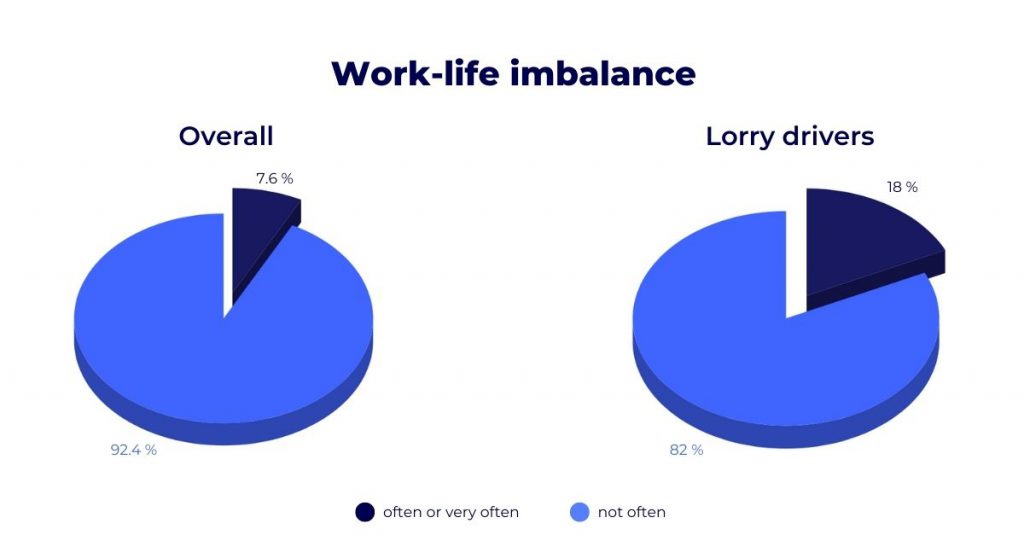
These figures are supported by another study on the subject of mental fatigue in different jobs. In 2020, 16% of all employees reported that they have feelings of exhaustion and fatigue several times a month or frequently because of their work. With 11% of employees feeling burnt out, the transport and logistics industry was one of the twelve jobs with the highest levels of mental fatigue examined in the joint study by CBS and the TNO [3]. Looking ahead, job stress and exhaustion will lead to a higher turnover rate [4]. This means that instead of people worrying about not getting a job in logistics due to automation, the situation may change to one where companies have to worry about not finding people who want to work in logistics.
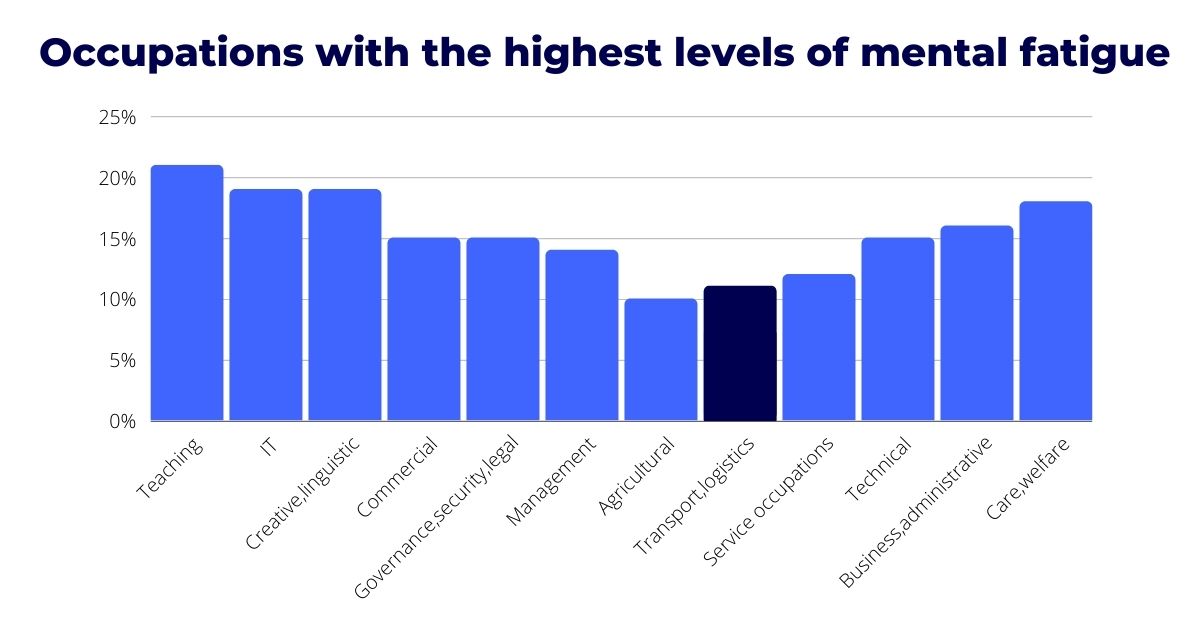
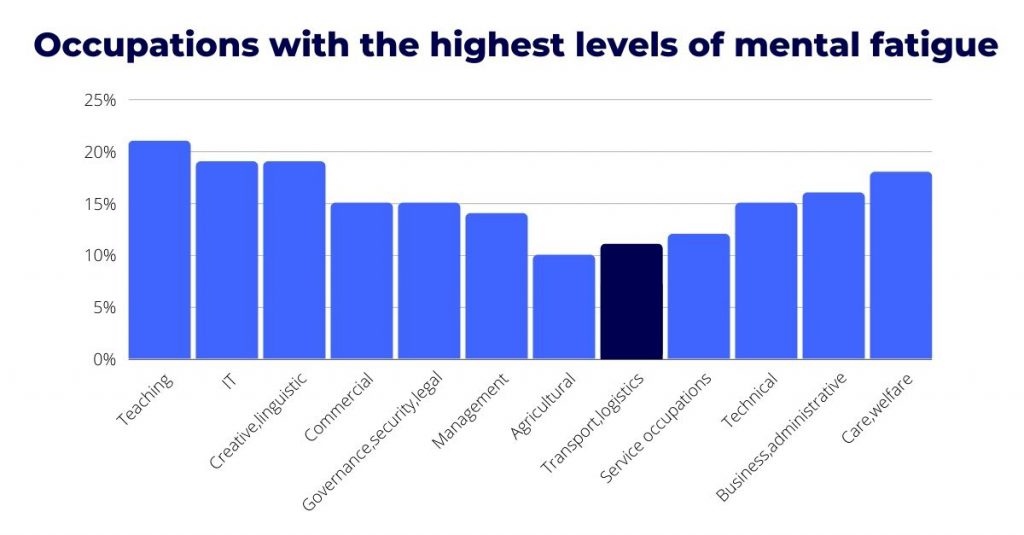
In most cases, job-related stress is caused by a combination of different factors, which is why a full assessment of the reasons for employee stress cannot be made. Nevertheless, there are industry-related factors that are frequently among the main stressors.
An empirical research conducted in Turkish logistics companies suggests that 20% of the variation in satisfaction among employees results from perceived job insecurity and stress. The term job insecurity outlines the stress resulting from a perceived discrepancy between the desired and the actual level of job security [5]. The dynamics and high competition in the logistics industry make it increasingly hard for organisations to provide a high level of job security to their employees. Sources of stress can be quite diverse and include time pressure, often accompanied by long working hours and weekend work, and a low skill discretion [6].
Deliveries are expected to arrive sooner and sooner, which increases the time pressure even more. Additionally, many businesses use just-in-time to cut costs and increase efficiency, forcing truck drivers to adhere to strict schedules despite often unpredictable traffic volumes.
A low skill discretion, meaning the daily usage of a small number of skills in someone’s job, by itself does not lead to stress and mental fatigue. However, its combination with high physical and mental job demands and a low decision-making authority increases psychological burden. For truck drivers, all these factors are quite significant, which is why it can be presumed that a high level of psychological stress is associated with this job.
Physical exertion can put further strain on employees, which also affects mental capacities. Long journeys in the seat of a truck with few breaks, working in difficult weather conditions and the cold, or even noise represent a constant source of stress. Additionally, shift work, which often takes place outside regular business hours, can lead to sleep deprivation – a phenomenon that can have both physical and mental consequences.
The infographic below gives an overview of many potential factors that can lead to work-related stress and mental fatigue in logistics occupations.
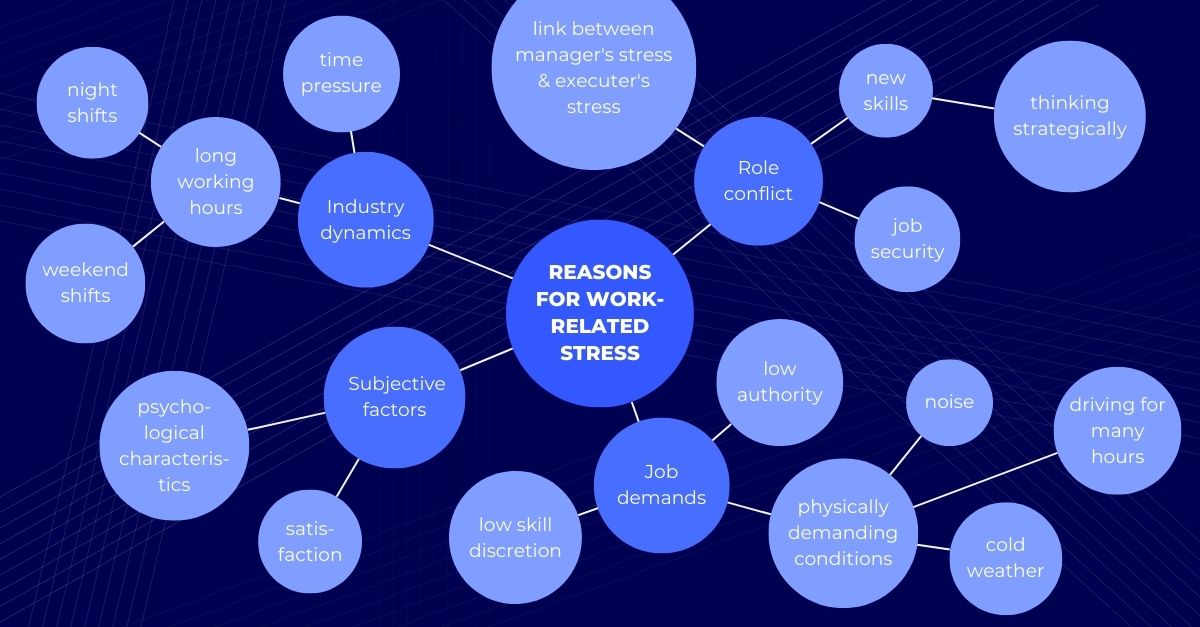
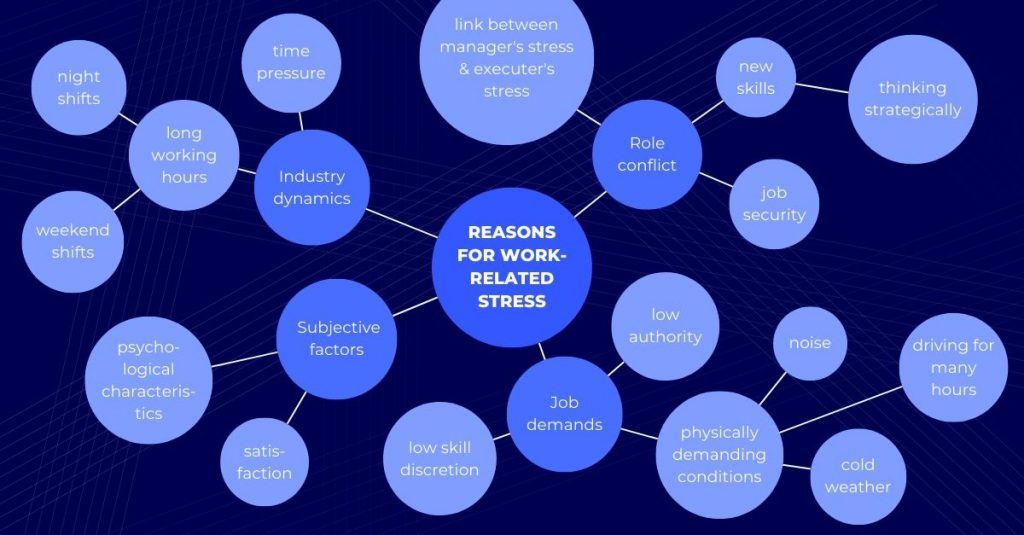
An imbalance between work and private life can lead to deterioration in both physical and mental health. It is not only the individual who is affected by worsening health status, but this also results in a higher turnover intention and absenteeism, which has a demotivating effect on colleagues and the company in general. Additionally, mental fatigue and other forms of physical and mental discomfort can have safety implications, such as a higher rate of road accidents due to a lack of attention. The infographic below shows the most prominent health complaints among professional drivers [4].
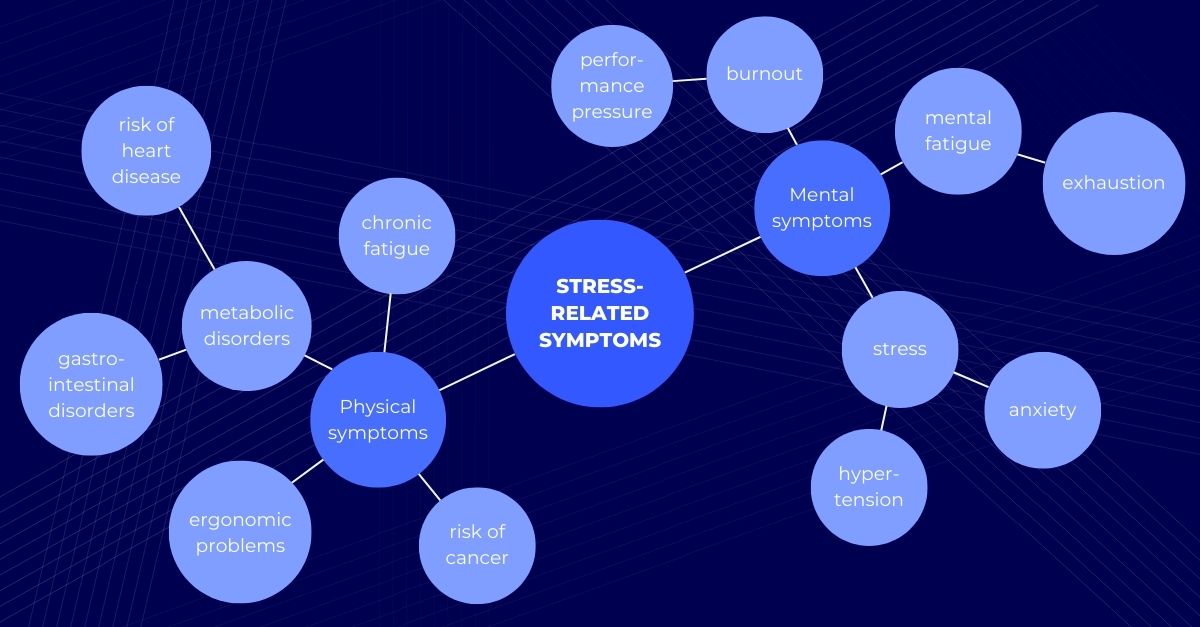
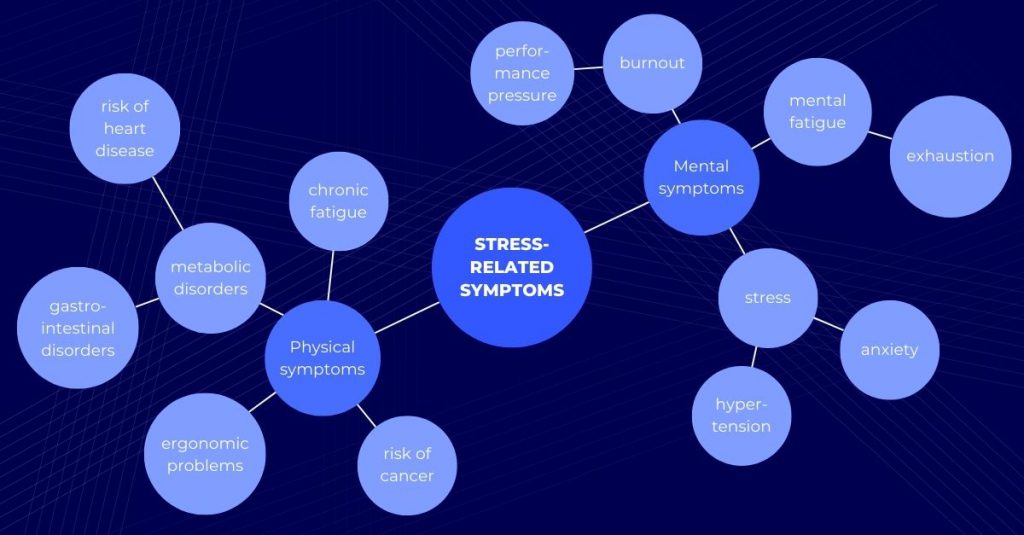
To be able to improve the working conditions and consequently the physical and mental health of logistics employees, more research analysing the challenges of working in logistics occupations needs to be conducted. However, some conclusions can be drawn from existing data. The mental stress resulting from time pressure and the increasing speed in the logistics process needs to be addressed. All processes involving human labour require compensation time for unexpected events, such as traffic congestion. Not only companies but also consumers can support this process, for example by planning longer lead times for deliveries. Wherever possible, companies should enable their employees to engage in flexible working arrangements, such as remote work or flexitime.
If companies manage to provide a greater level of job security to their employees, it will not only increase job satisfaction on the employee side but also increase productivity and improve the overall reputation of the company. The ergonomic conditions of the trucks should be designed in the best possible way to make the driving times more comfortable for the truck drivers. Most importantly, social support from colleagues and managers should be improved and open communication should be encouraged. This allows managers to respond to the circumstances and wishes of each individual employee, as challenges and health concerns differ for each person.
[1] OECD. (2021). 2021 Economic Survey of the Netherlands. Retrieved June 17, 2022, from https://www.oecd.org/economy/surveys/Netherlands-2021-OECD-economic-survey-overview.pdf
[2] CBS. (2021). Which jobs often cause a poor work-life balance?. Retrieved June 17, 2022, from https://longreads.cbs.nl/the-netherlands-in-numbers-2021/which-jobs-often-cause-a-poor-work-life-balance/
[3] CBS. (2021). Which jobs have the highest levels of mental fatigue?. Retrieved June 17, 2022, from https://longreads.cbs.nl/the-netherlands-in-numbers-2021/which-jobs-have-the-highest-levels-of-mental-fatigue/
[4] Useche S.A., Cendales B., Montoro L. & Esteban C. (2018). Work stress and health problems of professional drivers: a hazardous formula for their safety outcomes. https://doi.org/10.7717/peerj.6249
[5] Yaşlıoğlu, M., Karagülle, A.Ö. & Baran, M. (2013). An Empirical Research on the Relationship between Job Insecurity, Job Related Stress and Job Satisfaction in Logistics Industry. Procedia – Social and Behavioral Sciences, 99 (1), 332-338.
[6] Useche S.A., Montoro L., Alonso F. & Pastor J.C. (2019). Psychosocial Work Factors, Job Stress and Strain at the Wheel: Validation of the Copenhagen Psychosocial Questionnaire (COPSOQ) in Professional Drivers. Retrieved June 20, 2022, from https://www.frontiersin.org/articles/10.3389/fpsyg.2019.01531/full
Ready to join a new generation of transport planners? Create your free account — no credit card required.
Start shipping
✓ 20.000+ Active Users ✓ Save 30% in Costs ✓ 100% Online






1 out of 2 trucks drive around empty or partially empty. A huge waste of resources.
Ship with Quicargo. Save costs, time, and CO2 emissions.
Explore the platform for free
You have already subscribed.
Join 12.000+ subscribers.
We're commited to your privacy. You may unsubscribe at any time.
